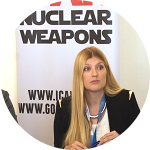At 8.15am on 6 August, 1945, a nuclear bomb was dropped on the city of Hiroshima in Japan. Three days later, Nagasaki was hit by a second nuclear bomb.
The two bombs killed more than 50 per cent of civilians in Hiroshima and 30 per cent of civilians in Nagasaki. Many more died in the following days and weeks, from a combination of severe burns, internal injuries, and radiation sickness.
According to a new report by the International Committee of the Red Cross (ICRC) and the Japanese Red Cross Society, 70 years after the bombings those who survived the blast are still suffering from the long-term health effects of exposure to nuclear radiation.
Survivors have struggled through stigma and persecution to come forward and share their stories. For decades, states have turned a deaf ear to their pleas and warnings.
While the Cold War is over, almost 16,000 nuclear weapons remain today.
Nine states possess them: the United States and Russia with the largest stockpiles, followed by China, the United Kingdom, France, India, Pakistan, Israel and North Korea. Almost all states have agreed that nuclear weapons should be eliminated, and the rhetoric surrounding these weapons might sound promising at times.
But 45 years after the Nuclear Non-Proliferation Treaty was signed and the five “official” nuclear weapon states ˗ United States, Russia, China, France and United Kingdom ˗ committed to negotiate nuclear disarmament, we are still far away from a world without nuclear weapons.
In fact, not only has the nuclear weapon states failed to fulfil their commitments to negotiate nuclear disarmament, but each one of them are currently pursuing enormously expensive upgrade and modernisation programmes.
New, more modern, more deadly nuclear weapons and delivery systems are being developed.
By allowing for such a large number of nuclear weapons to remain in stockpiles, the risk of an accident keeps increasing. Many of the almost 16,000 warheads are kept on high alert, ready to launch within minutes.
New research by Chatham House and Eric Schlosser, news stories by the Associated Press and whistle-blowers in the United Kingdom paint a worrying picture of near-misses, security breaches and other blunders that can turn into a catastrophic humanitarian emergency.
What if they were used?
If the world would face one or many nuclear detonations today, the consequences would be unimaginable.
A single nuclear bomb detonated over a large city could kill hundreds of thousands of people in just a few seconds. The effects would spread across regions and would affect unborn generations. The humanitarian suffering would be immeasurable.
In case of such humanitarian disaster, first responders such as the ICRC or the United Nations have admitted there is little support or relief it could offer in the event of a nuclear detonation.
Members of emergency services, other disaster responders, health care professionals, and the many people who may be called to assist in responses to humanitarian emergencies would face unique dangers and difficulties following any nuclear explosion.
Aside from the hundreds of thousands of immediate deaths, those injured would be left with little or no medical assistance.
The attacks on Hiroshima and Nagasaki have shown the extent of the humanitarian impact of nuclear weapons.
Despite the bombs only having a fraction of the nuclear yield of modern weapons, more than 200,000 men, women and children have been the victims of those attacks.
A new movement to prohibit nuclear weapons
So why hasn’t the international community done anything about it?
Sometimes it feels like people forgot about nuclear weapons, that we aren’t quite aware that they still exist.
A new focus on the humanitarian impact of nuclear weapons has emerged, that looks at the weapons for what they really are: indiscriminate, inhumane and unacceptable
Weapons like chemical and biological weapons, land mines and cluster munitions have all been declared illegal because of their humanitarian consequences. But nuclear weapons, the most destructive of them all, are still considered legitimate.
For the first time in a long time, there is hope. A new movement, led by non-nuclear weapon states, has emerged and is challenging the status quo.
Through three fact-based conferences on the topic in Oslo, Nayarit, and Vienna, evidence of the catastrophic humanitarian impact has been presented. The uncontested conclusions of these conferences highlighted that any use of nuclear weapons would be a wide-scale humanitarian emergency.
In addition, at the conclusion of the third conference in Vienna, the Chair’s summary notes that “it is clear that there is no comprehensive legal norm universally prohibiting possession, transfer, production and use” of nuclear weapons.
The Austrian government then issued a pledge to “pursue effective measures to fill the legal gap for the prohibition and elimination of nuclear weapons”.
Since the Vienna conference, states have been associating themselves with this pledge, and over 110 states have now declared themselves ready to fill the legal gap.
This group of states, a cross-regional and diverse group of states but without anyone relying on nuclear weapons for security, should now pursue negotiations for a new international instrument prohibiting nuclear weapons.
The 70th anniversary of the atomic bombings of Hiroshima and Nagasaki reminds us that nuclear weapons are not just theoretical concepts for deterrence; they are real weapons with unacceptable and indiscriminate consequences.
As long as nuclear weapons are seen as important and legitimate, it will encourage proliferation and maintenance of current arsenals.
The work to stigmatise, ban and eliminate nuclear weapons is the best defence against the use of nuclear weapons.









